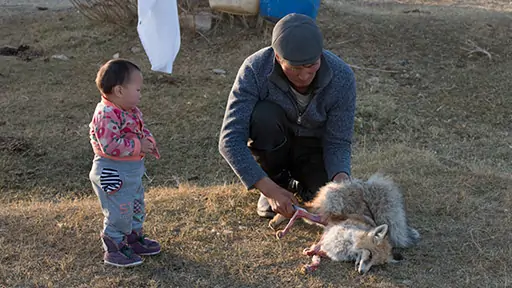Indigenous Calendar November, 2018: Delight of Discovery

I've always experienced delight from discovery. These days it comes mainly from traveling. My travels a year ago found me in western Mongolia, where I spent a month living among Kazakh communities. On one particular day I experienced delight from discovery three times: once accompanying eagle hunters on a successful hunt in the Altai Mountains; then witnessing this young girl watching as her father skinned the fox that we had caught; and finally discovering how to take this month's photo.
Hunting with eagles has been a part of Kazakh culture for centuries. Not surprisingly, there are stories and legends that they tell about celebrated eagles, hunters, huntresses and hunts. Many of these stories are now lost since they were handed down through oral history only. As a part of preserving Kazakh culture perhaps the time has come for some of these eagle hunters to begin writing these stories.
The Indigenous Literary Studies Association is a Canadian organization that promotes and supports indigenous literature of this kind. Last year it announced the inaugural "Indigenous Voices Awards" to go a step further and actually recognize and reward emerging indigenous writers. The event took place in May this year. The awards were conceived by lawyer Robin Parker who called the idea an "antidote to rising intolerance." That same rising intolerance is showing itself increasingly around the world these days.
The Yellamundie National First Peoples Playwriting Festival similarly promotes and supports indigenous literature, but in Australia. There, Ellen van Neerven is an award-winning indigenous Mununjali writer. She is among six people recently chosen to have their work read at the festival in late January next year. Festivalgoers will be able to experience delight from discovering her performance poem, Swim.
Their reaction will, hopefully, be different from the one her work received a year ago. She played no part in the decision to include this question in reference to one of her poems, Mango, in a high school exam: "Explain how the poet conveys the delight of discovery." A few of the students taking the exam were frustrated at not being able to explain such delight and later took to social media to lash out at the writer herself in a tirade of abuse and insult.
The fox on this occasion was awarded to the spotter. He made short work of skinning it as his daughter watched intensely. Barely yet walking, she experienced in just a few minutes the delight of discovery that some young Australian adults cannot relate to. Some commentators speculated whether this would have happened had van Neerven been male or non-indigenous. My own speculation is somewhat different: Would this have happened if the Australian education system taught respect?
Since this month's photo was taken I experienced delight from discovery a fourth time: it appears at the very end of my latest documentary (link below) which will be released this month.
The Altai Kazakh people are the subject of our documentary, The Last Kazakh Nomads of Mongolia.
If you enjoyed reading this article, please consider supporting independent, advertising-free journalism by buying us a coffee to help us cover the cost of hosting our web site. Please click on the link or scan the QR code. Thanks!


